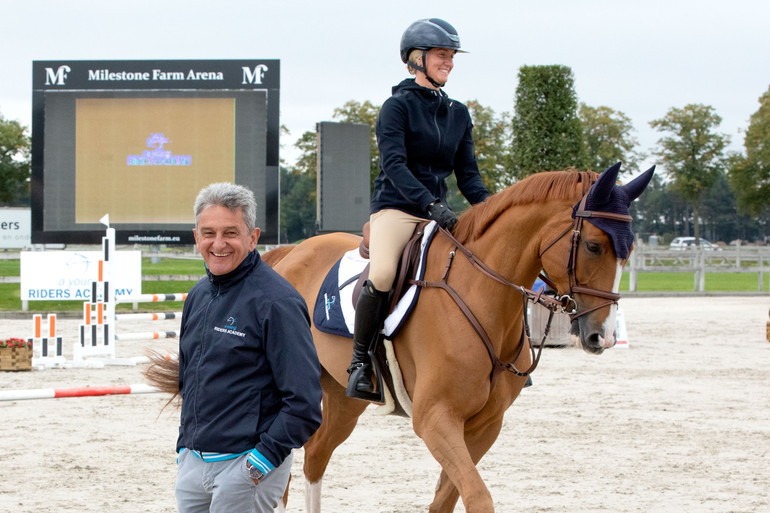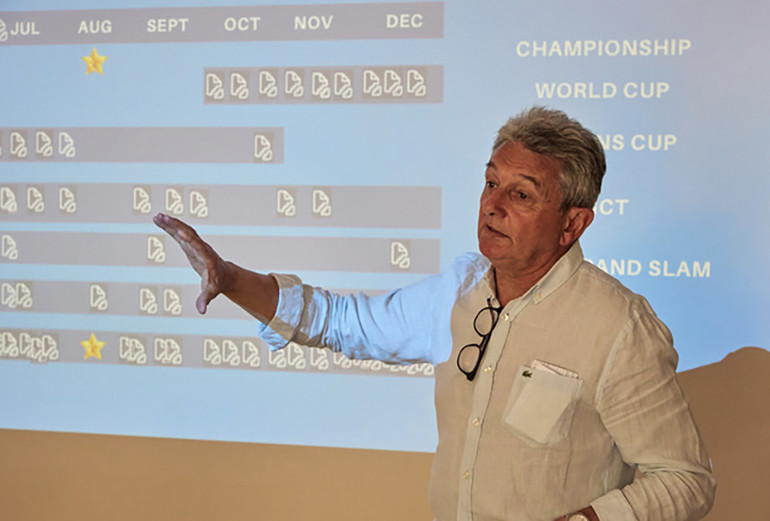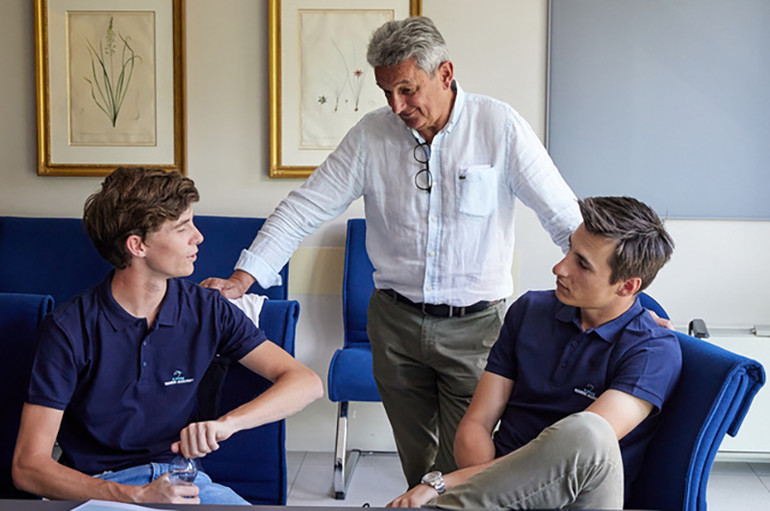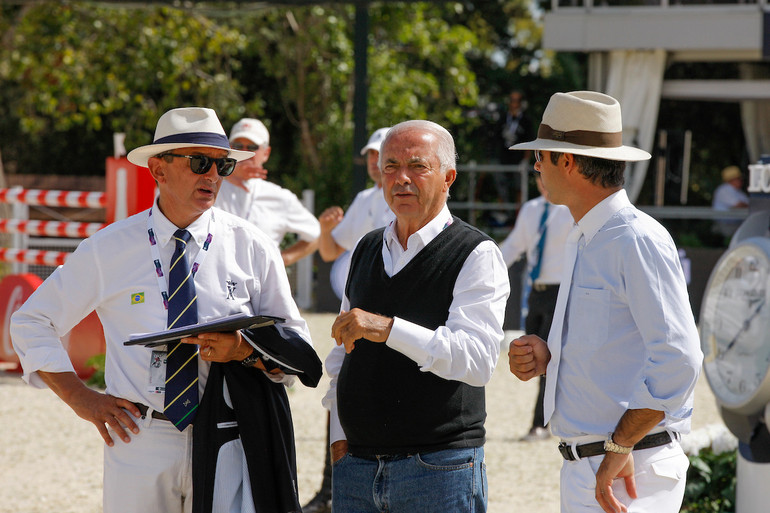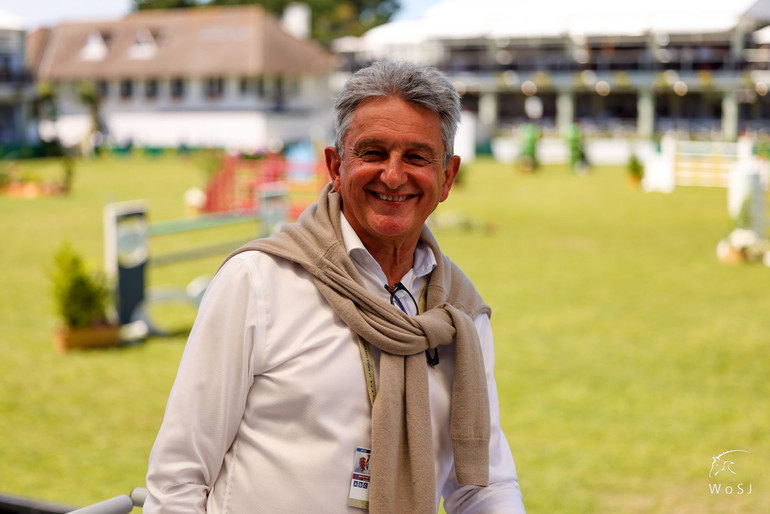 “I consider that now, when I am 64, it is time to give back. After everything this sport gave me, it is very important to return the effort and to share my experience; this is my passion and my activity today," Jean-Maurice Bonneau tells World of Showjumping. Photo © Jenny Abrahamsson for World of Showjumping.
“I consider that now, when I am 64, it is time to give back. After everything this sport gave me, it is very important to return the effort and to share my experience; this is my passion and my activity today," Jean-Maurice Bonneau tells World of Showjumping. Photo © Jenny Abrahamsson for World of Showjumping.
Text © World of Showjumping
“As long as we have people who like to share their knowledge and give back, our sport will continue in a good direction – I am sure; it is my real belief,” Jean-Maurice Bonneau tells World of Showjumping. “I started my career in the equestrian world as a groom, and this sport has given me so much – so much more that I could have ever imagined when I was a teenager. I consider myself lucky, even though I have also worked hard. When I was a child, I did dream; I had posters of Nelson Pessoa and Marcel Rozier in my room, and one day I got to work with them. Can you believe that? My dreams came true, and now I consider it my duty to give back.”
God gives us talents, but not all of them
After working as a groom, Bonneau moved on to establish a career as a professional rider before finding his true passion: Training. “I never put together a business plan, one thing simply led to another,” he reflects on his journey from groom to Chef d’Equipe for the French team. “As a rider, I had my first international selection in 1988 in Sopot, where I jumped my first Nations Cup. I competed at the European Championships in 1995 in St. Gallen and won team bronze with Herve Godignon, Roger Yves Bost and Alexandra Lederman. A year later, I sold my horse and started to work as a trainer for the Japanese riders. I was a normal rider, not a super-star, but a good soldier for the team. Luckily, I discovered that my real talent was in training, and I have so much fun with it, trying to get into the brain of my riders, finding a way to help them to win and do their best.”
My dreams came true, and now I consider it my duty to give back
“The team management is something l love as well, because it is an interesting situation to have individuals who during a Nations Cup and championship work as a team; it is something really unique,” Bonneau says. “I think this is what I love the most; trying to assist and be on the side of my riders and help them find the keys, because a trainer does not do the work for the riders – a trainer simply helps them find the answers they are looking for. Being able to teach is something very special. I believe that God gives us talents, but not all of them – it is important to know which talents are yours and develop them.”
“During the four years that I trained Japan, I developed a real passion for training and started to work on my philosophy,” Bonneau continues. “I built up my training system on three pillars; one physical, one technical and one mental. I think in any sport, we have to check off these three major points. First of all, the physical issues; being able to do the sport properly. In our sport, we have the particularity of having two athletes; the horse and the rider. Second of all, the technical aspect; how to learn to solve the questions posed by the course designer. And the third – but certainly not the least important – is the mental aspect; being able to perform under pressure and deal with stress. I consider, as a Chef d’Equipe and a trainer, that you have to develop all these three aspects in order to become competitive and consistent. You have to be able to perform on the day that it matters – not the day before, not the day after, but on the day. When you miss in a Grand Prix, you have another one the week after, but when you are at major championship, you might only be getting that chance once in your life. I am very focused on how the athletes are able to stay cold-blooded during a competition and perform under pressure. Wherever I went during my career, I always taught based on these three principles. Riders have to be considered as top athletes and it is interesting to see how the top 10, 20, 30, 50 in the world today are all fit. Most of them are following a physical training program and they are all aware of the three aspects of our sport.”
I believe that God gives us talents, but not all of them – it is important to know which talents are yours and develop them
After his time with the Japanese team, Bonneau was appointed as Chef d’Equipe for the French team and he worked with them from 2000 to 2006. After, he took over the Brazilian team and with Bonneau as their team manager and coach, they ended 5th at the 2014 World Championships in Caen, second in the 2013 Nations Cup Final in Barcelona and fourth at the 2015 Pan American Games in Toronto. In 2021, Bonneau was announced as technical advisor for the Young Riders Academy. After over 45 years in the sport at different levels, also having been part of the organizing committee in Chantilly and serving four years on the FEI Jumping Committee, Bonneau has wide view of the equestrian world. “I am very involved with YRA now,” Bonneau tells. “I consider that now, when I am 64, it is time to give back. After everything this sport gave me, it is very important to return the effort and to share my experience; this is my passion and my activity today.”
The magic is in the intense moments
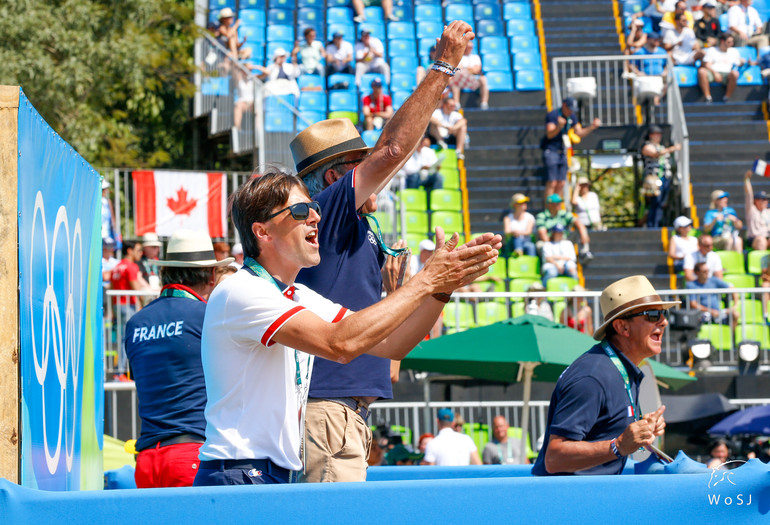 "I prefer the moments right inside the corridor, at the in-gate. During these instances, it is like I am in a big bubble, and when my riders are in the ring, I feel so connected to them – it is difficult to describe the intensity of these moments," Jean-Maurice Bonneau says. Photo © Jenny Abrahamsson for World of Showjumping.
"I prefer the moments right inside the corridor, at the in-gate. During these instances, it is like I am in a big bubble, and when my riders are in the ring, I feel so connected to them – it is difficult to describe the intensity of these moments," Jean-Maurice Bonneau says. Photo © Jenny Abrahamsson for World of Showjumping.
“I love the intimacy of moments like the morning of the final at a big championship; all those little moments with my riders when you are under pressure, but still feel so calm, so controlled,” Bonneau says when asked what still keeps him so deeply involved in the sport at the age of 64. “In these moments, you don’t even have to speak; just a look at your riders and you know what they think and vice versa. It is something very special. It is funny, because by chance, I have won some titles during my career, but those moments when it is all over, after the ceremonies, those are not the moments I prefer. I prefer the moments right inside the corridor, at the in-gate. During these instances, it is like I am in a big bubble, and when my riders are in the ring, I feel so connected to them – it is difficult to describe the intensity of these moments. And that is what I love; I am addicted.”
Those two minutes in the ring belong to you; you are alone in the ring with your horse – and that is the real value of this sport
“In competition, despite your background, despite who you are, the only thing that matters is the sport,” he continues. “As a rider, you have trained to be there, worked hard to be there, and those two minutes in the ring belong to you; you are alone in the ring with your horse – and that is the real value of this sport. It is not a question of the price of the horse, or anything else, because during this moment, you are with your horse, alone, and you have to communicate and be in harmony with your horse to do the sport properly. Even if you fail, as long as you have done everything you can, you cannot be blamed; because you have done your best. That’s why, for me, it is important when you debrief victories and failures, to focus on learning – that is what matters to me.”
“There are many riders complaining how they don’t have the money, but as long as you are on a starting list, you are there. So, don’t complain, but do the sport,” Bonneau points out. “Some people complain about courses as well, but the point is not about the riders liking the course or not – the point is to solve the problems the course designer has set. In the end, this is what our sport is about, and the spirit of our sport is what gives me energy to wake up every morning and return to the arena.”
An international language
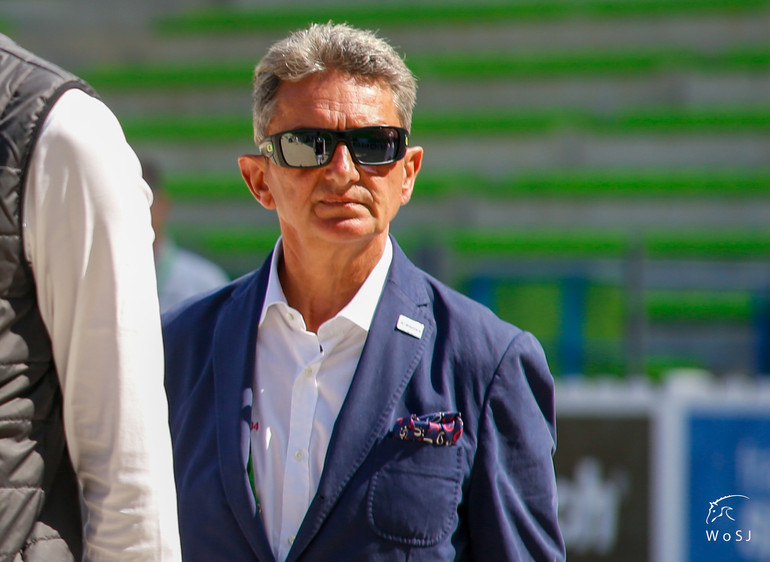 "When we teach, it is not only about the technical details, it is also about the philosophy, and I fully agree with Franke Sloothaak; the philosophy with which we approach the horse, is paramount to get right at the very start," Jean-Maurice Bonneau says. Photo © Jenny Abrahamsson for World of Showjumping.
"When we teach, it is not only about the technical details, it is also about the philosophy, and I fully agree with Franke Sloothaak; the philosophy with which we approach the horse, is paramount to get right at the very start," Jean-Maurice Bonneau says. Photo © Jenny Abrahamsson for World of Showjumping.
“Obviously, the first point is to consider the horse with a maximum care and attention,” Bonneau says about his approach to teaching. “Not only because of the pressure from different activists – who don’t have any idea of our sport – but as a sport, we have to be more transparent and consider the horse differently, not as we did in the past. The ethics are changing with the evolution of the society, and we have to be aware of this. As a community, we have to show that we have nothing to hide; we have to explain why we approach the horse the way we do. When we teach, it is not only about the technical details, it is also about the philosophy, and I fully agree with Franke Sloothaak; the philosophy with which we approach the horse, is paramount to get right at the very start.”
When we teach, it is not only about the technical details, it is also about the philosophy
“Sometimes when I give clinics, I ask the riders: ‘Do you know what kind of animal you are sitting on?’ A horse is a herd animal, a prey, and its defence mechanism is to escape. If you know that, if you know the way horses are, you will totally change your behaviour around them. When you teach a horse, you can’t – in my opinion – obtain anything if your demand is not clear. So, when failing, riders have to stop and ask themselves; did I ask properly? Today, to communicate, we speak English – if I speak French to someone who doesn’t speak French, they won’t understand me. Equitation is an art, and it is an international language like music; if a Japanese rider buys a horse who has been ridden and produced by a German rider, as long as he knows the codes, he can ride a horse from anywhere! And the horse will feel confident, because the orders will be clear and understandable. So, when you fail – which will happen often and that is why it is such a fantastic sport and keeps you humble – start to question yourself; ‘did I do things properly?’. Sometimes with horses, you have the feeling that you go slow, when in fact you are going very fast, because if you obtain one percent of what you want every day, you have 99% after three months.”
Equitation is an art, and it is an international language like music
“The relationship a rider has with their horse is paramount,” Bonneau continues. “I don’t consider it is a rider and a horse; I consider they are a couple, a combination. Often, we get asked about what percentage of the result is the horse, what is the rider – but I have realized that the best riders, they always have good horses, because they develop them. If you look at the last World Cup Final, and if you look at Henrik and King Edward; which one is better? You cannot say, because they are together, they are in perfect harmony. But to arrive there means a huge investment, a lot of work, but also brain; how do you manage your horse, which shows you do in preparation, etc. That is why I think all top riders must be smart, because they use their brain in a good way.”
Preach in the desert
“I am positive, because the sport is developing, but at the same time I worry,” Bonneau says when he moves on to speak about the future of the sport. “The voting system the FEI has in place is made up with one vote per country, which means that we have countries that don’t have any clue about our sport having the same power as big, knowledgeable, equestrian nations like Germany, Belgium, France, USA… For me, the representation within the FEI does not really reflect the sport. I am not a politician, and I don’t have a solution, but I do wish we could find a better balance.”
It should not only be about words, because that is only cosmetic
“Normally, the FEI Jumping Committee is organized with stakeholders that know the sport, and I think they should maybe be listened to a bit more,” Bonneaus says. “The main difficulty of having riders more involved in the politics is the fact that they are very busy. Top riders compete until Sunday evening, arrive home late at night or even on Monday morning, and they have two days at home to ride and develop the horses there, and then they go to another show. It is a huge investment for someone like Kevin Staut, who is the president of the IJRC, and all the riders around him, like Max Kühner and Steve Guerdat, to take the time and be really involved. However, it is essential to have the riders involved, even if we at times have a feeling that they preach in the desert. Sometimes the riders and other stakeholders are not considered and heard enough when it comes to the political issues."
It is all about daily behaviour
“I believe that moving forward, we really have to pay attention: It should not only be about words, like having a study about horse welfare – because that is only cosmetic, it is like make-up, hiding things behind these pages,” Bonneau says. “It is all about daily behaviour. That is why I consider that people like myself and all those who have been in the sport for decades have to give back. Giving back is our way to fight for the future of the sport; by sharing our knowledge, our philosophies – and we want to share this with the youth.”
“I am not the kind of person to think it was better before; we have to live with our time,” Bonneau continues to speak about the many changes the sport has gone through in the past years. “For me, the biggest change in our sport came when Jan Tops created the Global Champions Tour. Like with everything in life, you have positives and you have negatives… One of the positive points is how the level of every show was raised after this, even at the lower star-levels. Another positive is the level of the riders, it is just amazing to see how close to each other the top riders are. Years ago, when you had a start list for a Grand Prix, you could easily predict the winner, whereas today when you have a start list, 80-90% of the riders can win – not be placed, but win! That is good, because we can see beautiful sport. However, even if we have many positives, we also have questions and warning signs. One example is the schedule of the horses these days: How many shows and how many classes are they jumping annually? When they are also asked to travel all over the world, I believe there should be a rule to limit it to some degree.”
Even if we have many positives, we also have questions and warning signs
“And when speaking of changes, I can’t avoid mentioning the format of the Olympics, with three riders and no drop score,” Bonneau continues. “In a way I can believe that it is easier to understand, but I am not certain. If we want to talk about horsemanship, this is not a decision considering horsemanship and the welfare of the horse – it is too risky. One of the reasons behind the new format is to have more flags, but we have to make sure that those countries are at the right level. Can you imagine going to Tokyo, and you arrive and you have a lame horse, like we had in Rio with the French team, or Penelope who fell off on the first day? That would have meant the competition for the French team was over. For me, three riders, it is too hard – we have to have a competition. That is my opinion, and I know I am not the only one to question this.”
Together, with our different skills, knowledge and experience, we have to find a way to develop the sport
“However, we can dream of a better world,” he continues. “Why doesn't the FEI organize a seminar with all the representatives of the sport – riders, course designers, owners, grooms, media, organizers – around one table after each Olympic Games? First of all, to study the statistics and the image of our sport, and second of all, to address any issues. Together, with our different skills, knowledge and experience, we have to find a way to develop the sport – one person alone can not solve this. How is the sport going to be tomorrow, in which direction do we want to go? Today, we let the future come as it comes, like a wave, but as in any business, we should question ourselves as well. I ask myself all the time; am I good enough? What do I have to change? In which direction do I want to go? For me, the only way to stay involved in the top sport, even when you become older, is being critical and mindful, and this should be done to the sport as a whole as well.”
Brain in command
The mental aspect of the sport is one of the three pillars in Bonneau’s training philosophy, and he believes that it is the brain that determines if a rider makes it to the top or not. “You cannot improve and you cannot reach the top if you don’t have an open mind and if you are not willing to learn,” Bonneau says firmly.
“Luckily, in my career I have had the opportunity to train top champions like Eric Navet, Rodrigo Pessoa, Pedro Veniss, Kevin Staut, Philippe Rozier and Marlon Modolo Zanotelli – among others – and they all have one thing in common: They are clever. They are clever, open-minded, curios; they want to learn, every day. If your brain is lazy, and you consider you know everything when you are 25, you have zero chance. Our aim with YRA is to develop talented riders with a program that makes them champions of tomorrow. And what do we expect from champions? They have to be able to communicate, make contracts – to be a top-level rider means also being a manager. Most top riders ride for their own company with their own employees, sponsors and owners and they have to be able to secure their life. At the end of the day, the reason it is so hard for the youth to reach the top, is that just recently, Bosty – who is almost 60 – won the Grand Prix in Fontainebleau, and Pius – 61 – won in Montefalco: This sport is about a long-term career, and to exists long-term, you have to manage several things. Being a professional is a choice and means hard work, but in a good way. If you make noise without work, there will be no success; the brain has to be in command.”
“We cannot speak about the top sport without mentioning the grooms,” Bonneau concludes. “A top rider and a top horse are nothing without a good groom. Who are the main actors in our sport? Obviously, grooms are a part of this group. I have such big admiration for grooms, they have so many skills that help their riders; they can do so many things. The first circle of a horse-and-rider-combination is the owner and the groom. It is not a question, it is a fact; a top rider needs a top groom. However, grooms are still not considered enough; an example is the schedules of the indoor shows where they often end up working until 1AM. Grooms deserve better and I feel close to them, because I was a groom as well – and in life, you should never forget where you come from.”
18.7.2023 No reproduction of any of the content in this article will be accepted without a written permission, all rights reserved © World of Showjumping.com. If copyright violations occur, a penalty fee will apply.



